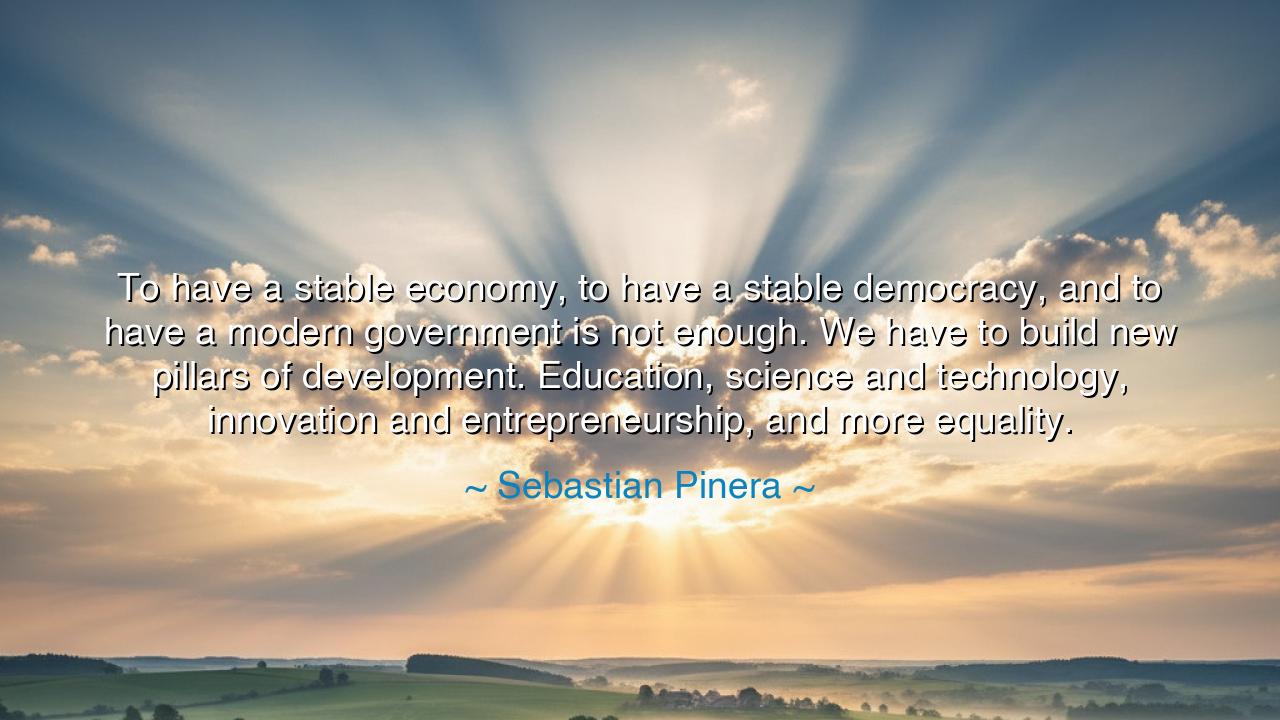
To have a stable economy, to have a stable democracy, and to have
To have a stable economy, to have a stable democracy, and to have a modern government is not enough. We have to build new pillars of development. Education, science and technology, innovation and entrepreneurship, and more equality.






When Sebastián Piñera declared, “To have a stable economy, to have a stable democracy, and to have a modern government is not enough. We have to build new pillars of development: education, science and technology, innovation and entrepreneurship, and more equality,” he spoke as a leader who understood that stability without vision is stagnation. His words were not meant as mere political rhetoric, but as a call to the nations — especially to his own Chile — to rise beyond comfort and seek renewal. For in every age, the greatest danger to civilization is not chaos, but complacency. To Piñera, a country content only with its order and prosperity is like a tree with strong roots but dying branches. Without the nourishment of knowledge, innovation, and justice, even the most stable society will eventually wither.
The origin of this quote lies in Piñera’s vision during his presidency of Chile, as he sought to transform his nation from an emerging economy into a knowledge-driven society. Having inherited a stable democracy and growing market, he saw that material progress alone could not sustain the future. He recognized the need for education and technology to empower the young, innovation and entrepreneurship to awaken the creative spirit, and equality to bind the people together in shared opportunity. His insight was that true prosperity cannot rest solely on wealth, but must rise upon wisdom — that the greatness of a nation is measured not by its riches, but by the enlightenment of its citizens.
Piñera’s words echo the teachings of the ancients, who knew that civilization must forever renew itself through the pursuit of knowledge and virtue. The philosopher Plato warned that a city ruled only by wealth or power would crumble, for without education and moral balance, it would breed arrogance and decay. Similarly, Piñera reminds his people that democracy and prosperity are not destinations, but foundations — foundations upon which must be built new temples of learning, creativity, and fairness. For stability may preserve the body of a nation, but only innovation and equality preserve its soul.
Consider the story of the Golden Age of Athens, when the city rose from the ashes of war to become the cradle of philosophy, art, and science. Its stability under Pericles was not enough; what made Athens immortal was its investment in education and innovation — in the cultivation of minds like Socrates, Phidias, and Hippocrates. It was through this faith in the intellect that Athens transcended its time, proving that the power of a nation lies not in its armies or wealth, but in its ideas. Yet even Athens fell, for it failed to balance genius with justice; it forgot that equality is the breath that keeps democracy alive. Thus, Piñera’s warning stands as both a celebration and a caution: without fairness, the very light of progress can cast deep shadows.
In invoking entrepreneurship and science, Piñera honors the eternal spirit of creation that drives humanity forward. Every great era — from the Renaissance to the Industrial Revolution — was born not from stability, but from the courage to question, to experiment, to imagine a better world. The wise ruler does not merely maintain peace; he stirs the minds of his people, so that invention and enterprise may transform peace into purpose. Yet, Piñera reminds us, innovation without equality becomes exploitation, and equality without innovation becomes idleness. It is the harmony of these forces — creation and compassion — that ensures the enduring vitality of a nation.
His mention of “more equality” reveals a truth deeper than policy — that prosperity divided is not prosperity at all. A stable government that allows its citizens to drift apart in privilege and poverty is like a ship that sails smoothly while half its crew is chained below deck. No amount of progress in science or technology can redeem a society that forgets the dignity of its people. Thus, equality is not a favor granted by the powerful, but a pillar upon which all other progress rests. A nation that educates every child, empowers every worker, and uplifts every dreamer builds a fortress stronger than any army or market can provide.
Let this be the lesson passed down to those who lead and those who follow: stability is the beginning, not the end. A nation, like a human soul, must constantly evolve — learning, inventing, and extending its blessings to all. To build the future, we must tend not only to the economy but to the mind, the heart, and the spirit of the people. Let education be our seed, innovation our water, and equality our sunlight. For as Piñera teaches, it is not enough to have peace and prosperity; we must have purpose — and only when we build upon these new pillars will our civilization stand firm against the ages, radiant and unshaken, a beacon to those yet to come.






AAdministratorAdministrator
Welcome, honored guests. Please leave a comment, we will respond soon